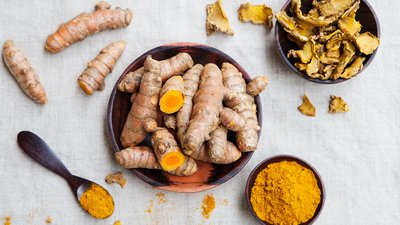Depending on the hemisphere you live in, you may be entering either winter or summer. Many pathogens become more prevalent in winter, with the cold and flu being common examples. Sickness can occur at any time, however, and people with a suppressed immune system, such as the elderly, the highly stressed, and even those who exercise at a high intensity on a regular basis, may be more vulnerable. There are many natural herbs and nutrients that may support immune function during these times and give your body everything it needs to stay at full capacity so you can continue your fitness journey unimpeded.
Some Notes on the Immune System
Innate versus Adaptive Immune Response
The innate immune response is the very first line of defense when an intruder makes contact with the immune system. It could be a harmful organism (bacteria or virus, for example) or a food component that gets through the gut wall as part of leaky gut. The immune system acts swiftly to remove the intruder within four days of getting infected. At the same time, the immune cells also send chemical signals to start recruiting more forces to come and help with the invasion.
The chemical signaling molecules produced during this first line of defense include histamine, bradykinin, serotonin, leukotrienes, and prostaglandins. They all produce inflammation, which is what creates redness, swelling, heat, and pain. Think of the swelling inside your nose and the increased mucous production when you get a cold or the fever you get with viral infections such as the flu. These inflammatory products are what make you feel miserable when you are sick, not the bacteria or the virus itself. Bacteria and viruses merely act as the trigger.
After about four days, the adaptive immune response kicks in. This is the second line of defense and a bit more specialized. The immune system adapts to become more specific to the pathogen intruder. Sometimes, however, things can go wrong and other cells get in the firing line when pathogens are being killed, which is how autoimmune disease can start. The adaptive immune response employs T and B lymphocytes as part of the immune system and can clone them very quickly when an infection is present. Each new cell that is produced will be exactly the same as the cell it came from and will target the exact same pathogen. So, if you get the flu, your immune system will make millions of T and B lymphocytes that will specifically kill the flu virus only.
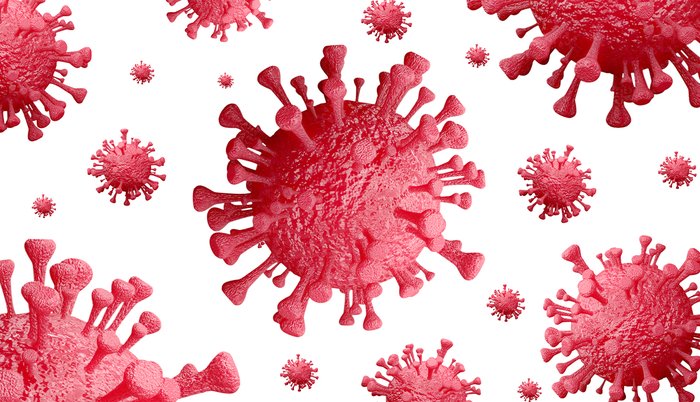
Humoral versus Cellular Immunity
The immune system uses two adaptive mechanisms to protect from foreign invaders, namely cellular and humoral immunity. Humoral immunity is all about making antibodies, whereas cellular immunity is about destroying infected cells. Both mechanisms produce inflammation that needs to be managed. Chronic inflammation that is left uncontrolled can damage healthy cells and contribute to bigger health problems than just having an infection.
Humoral immunity occurs when the body makes antibodies against something that is outside the cells and moving around freely in bodily fluids such as blood or mucous. T-helper cells help the B cells change into more specific cells that then bind to antigens on the outside of the invader organisms and neutralize them through a process called phagocytosis, during which B cells are cloned with a memory of the particular antigen on the harmful organism. It's like taking a mug shot or fingerprints. The memory B cells remain inactive but hang around and will instantly recognize the organism if they encounter it again, hastening the process of eliminating the threat the next time around.
Cellular immunity becomes involved when the pathogenic organisms are already inside the cells. Viruses cannot make you sick unless they get inside your cells where they can replicate. The cell-mediated response is the most effective response when it comes to removing virus-infected cells. T-helper cells release inflammatory factors that help the T cells transform into cytotoxic T cells, which can then destroy the infected cell by triggering apoptosis, or cell-suicide.
It is important to support both humoral and cellular immunity in the adaptive response so the immune system can get rid of infected cells, but at the same time you want to make sure that the adaptive responses do not go into overdrive and cause massive inflammation and cellular damage. It's all about maintaining balance.
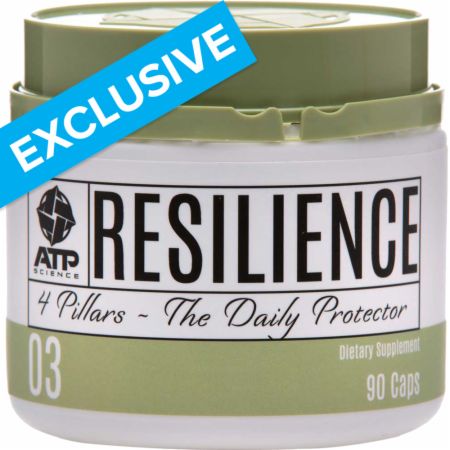
Definitions
Before we get to our top five herbs for bolstering the immune system, here are a few key definitions:
- Immunostimulatory describes something that stimulates the immune system by activating it or increasing its activity. Stimulation means more B and T lymphocytes and more immune cells, but also more inflammation.
- Immunosuppression is something that prevents the immune system from reacting to antigens and launching an attack. Sometimes this is necessary, such as in the case of organ transplants, where you don't want the immune system to attack the new organs.
- Immunomodulation is modulation of the immune system, bringing it to back to normal levels where it self-regulates. Basically, something that is immunomodulatory will calm down an overactive immune system, protecting you from your own defense mechanisms without suppressing an underactive immune system. In other words, it provides balance.
5 Popular Herbs That Are Good for the Immune System
1. Ganoderma Lucidum (Reishi Mushroom)
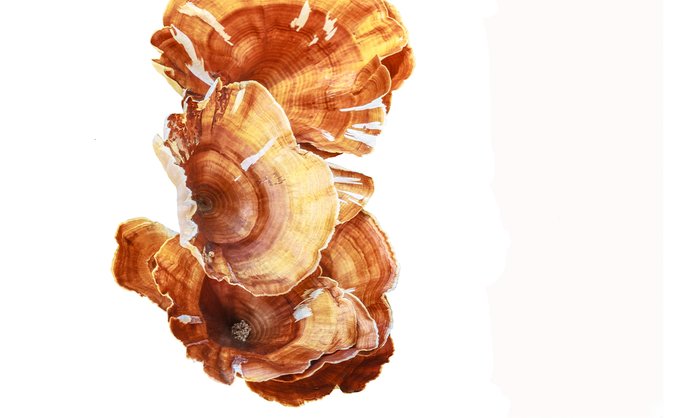
Reishi, or lingzhi, mushroom, is a large dark mushroom with a glossy exterior and a woody texture that has been called, "the mushroom of immortality," "the 10,000-year mushroom," and "the mushroom of spiritual potency." It typically grows on tree stumps and the base of trees such as the maple, but only on 2-3 trees out of 10,000, making it a pretty rare find in the wild.
It is easy to understand how this mushroom has come to be used in traditional practices as it has roughly 400 bioactive compounds, with the polysaccharides and triterpenes probably the most researched of them. Reishi is known to support both the innate and adaptive immune responses. It has the potential to strengthen those first-line defenses all the way through to the adaptive responses while still managing the body's response to stress.*
Ganoderma lucidum is found in tablet, capsule, powder, and liquid forms as a supplement, but don't forget that it is a food. To get all the goodness for your immune system out of the mushrooms, you have to break their cell walls, which means cooking them. It's the same for supplements. Just drying the mushrooms and powdering them to use in supplements may not have the health benefits reishi is known for. The mushroom must be processed using specific methods to ensure a high-quality supplement that actually works.
You can find many recipes online for preparing Ganoderma lucidum, so have fun experimenting.
2. Artemisia Annua (Sweet Wormwood)
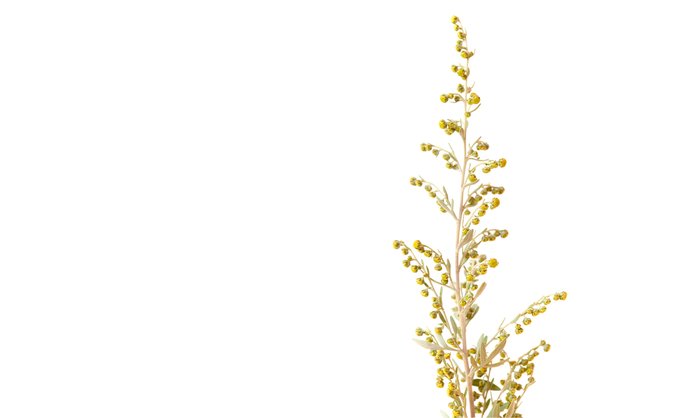
Sweet wormwood, also known as Chinese wormwood, or qing hao, among other names, is an ancient herb that has traditional uses dating back as far as 168 B.C. It has been used for more than 2,000 years in Chinese culture. Note that not all Artemisia species have the same action. The reference here is specifically to the Artemisia annua variety.
Artemisia annua has a great reputation in modulating the immune system, meaning that it balances immune responses and prevents overstimulation and excessive inflammation. Its actions are very much directed at the adaptive immunity responses that usually kick in four days after you get an infection.*
Wormwood has a bitter flavor and is used to brew liqueurs and other alcoholic beverages.
3. Ursolic Acid
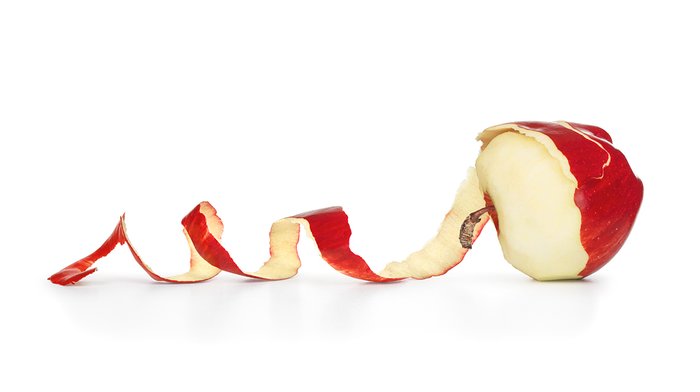
Technically, ursolic acid is not an herb but an active compound found in apple peel and other fruit peels, rosemary, thyme, elder flower, and other herbs and plants.
Ursolic acid has been shown to enhance interferon-gamma (IFN-g) production, which features in the cellular immune response in adaptive immunity.[1] IFN-g is an important immune factor that switches on many other genes and proteins that help the immune system function at full capacity.*
Ursolic acid seems to have a strong mechanism for controlling the inflammatory response, which may be beneficial in helping your body properly respond to stress and intense exercise.[2] You would probably have to consume a lot of the above-mentioned foods to get the amount of ursolic acid used in these studies, but still, it is food and food is good.*
4. Curcuma Longa (Turmeric Root)
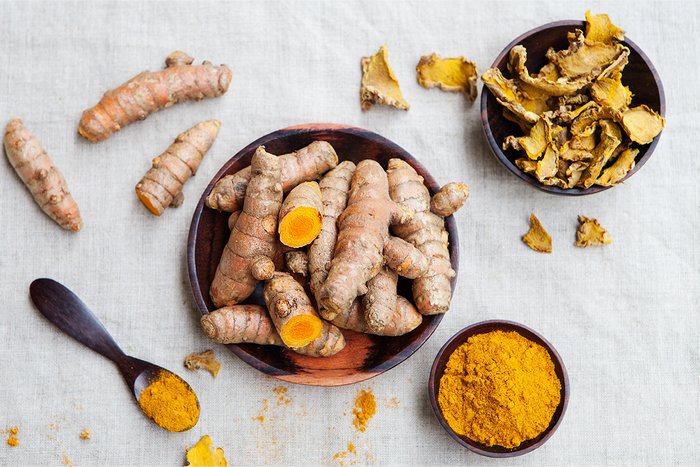
Turmeric is well-known as the orange-yellow spice used in curry powder, but turmeric, or curcumin, supplements are also among the top-selling herbal supplements in the U.S. Curcumin is best known for its association with a decreased inflammatory response to exercise, with many people using it for recovery from delayed-onset muscle soreness. In the past two decades, however, research has shown that curcumin is also a powerful immunomodulator. It specifically modulates the activation of T cells, B cells, and various other immune cells, all of the regular players that you find in both innate and adaptive immune responses.[3]*
Many curcuma longa supplements on the market focus on bioavailability and absorption of turmeric by adding black pepper or changing turmeric into liposomal or nanoparticle forms; however, the benefits to the immune system may come more from how your gut bacteria and turmeric interact inside the digestive tracts as opposed to absorption into the bloodstream. One study describes turmeric as having "prebiotic-like" effects on gut bacteria without being a prebiotic because it cannot provide energy for gut bacteria.[4] In fact, it seems to have more of a modbiotic effect by changing the composition of the gut and increasing the richness of bacterial species.*
The gut wall contains 70 percent of the cells that make up your immune system, and a healthy gut microbiome houses bacterial species that have a host of beneficial effects. Compounds produced by gut bacteria through the processing of turmeric and other herbs can trigger the release of signaling molecules in the bloodstream that provide systemic benefits. That's the way a lot of herbs and foods support the immune system.*
5. Boswellia Serrata
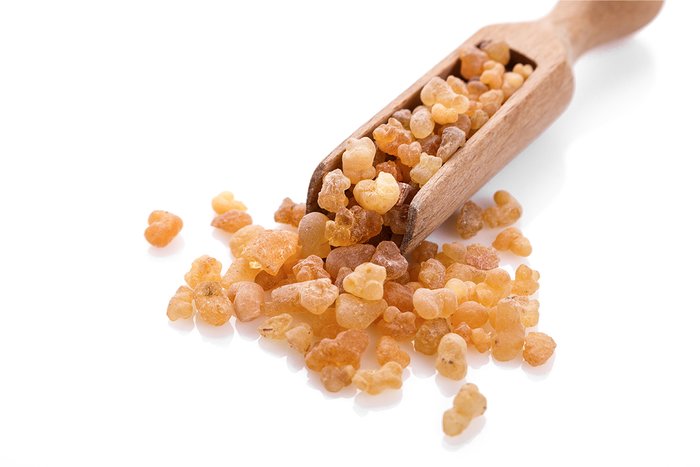
Boswellia serrata, or Indian frankincense, is a very underrated herb. Technically speaking, it is not an herb but a resin from a large-sized branching tree of the family Burseraceae that grows in the dry mountainous regions of India. Its two main active ingredients are 11-keto-beta-boswellic acid (KBA) and acetyl-11-keto-beta-boswellic acid, and it has been used traditionally in supporting healthy immune and inflammatory action, mainly as a 5-lipoxygenase (5-LOX) inhibitor.[5] *
But Boswellia serrata is more than just an anti-inflammatory. As part of the adaptive immune response, at lower doses it seems to enhance antibody production as part of humoral immunity and also increase B and T lymphocyte production as part of cellular immunity.[6] This is how Boswellia serrata, as an immunomodulator, can boost the immune response when it's needed most, as well as help keep your inflammatory responses from getting out of control.*
Boswellia serrata is pretty unpleasant to take as a liquid, and it will feel like it is stuck on your palate due to its high resin content. Definitely much better in a capsule form.

*These statements have not been evaluated by the Food and Drug Administration. This product is not intended to diagnose, treat, cure, or prevent any disease.
References
- Jang, Sun-Mi, et al. (2009). Ursolic acid enhances the cellular immune system and pancreatic beta-cell function in streptozotocin-induced diabetic mice fed a high-fat diet. International Immunopharmacology, 9(01), 113-119.
- Chekcer, Rahul, et al. (2012). Potent anti-inflammatory activity of ursolic acid, a triterpenoid antioxidant, is mediated through suppression of NF-kB, AP-1 and NF-AT. Plos One, February 20.
- Jagetia, Ganesh Chandra, & Aggarwal, Bharat B. (2007). "Spicing Up" of the immune system by curcumin. Journal of Clinical Immunology, 27(1), 19-35.
- Peterson, Christine T., et al. (2018). Effects of turmeric and curcumin dietary supplementation on human gut microbiota: a double-blind, randomized placebo-controlled pilot study. Journal of Evidence-Based Integrative Medicine, 23, 2515690X18790725
- Gerbeth, Kathleen, et al. (2013). In vitro metabolism, permeation, and brain availability of six major boswellic acids from Boswellia serrata gum resins. Fitoterapia, 84, 99-106.
- Ammon, H. P. T., (2010). Modulation of the immune system by Boswellia serrata extracts and boswellic acids. Phytomedicine, 11, 862-867


